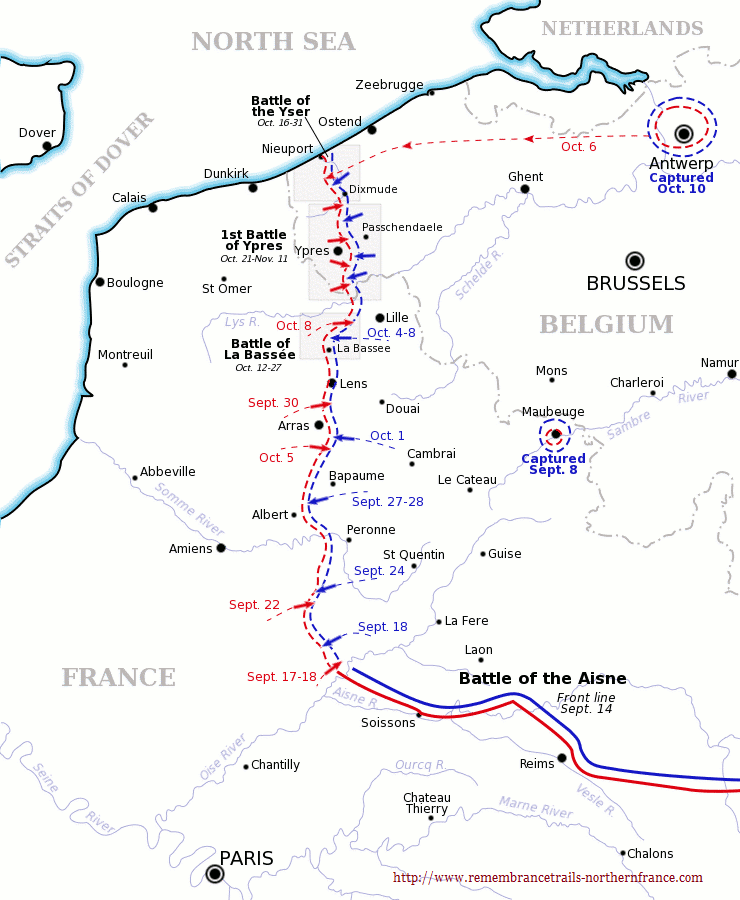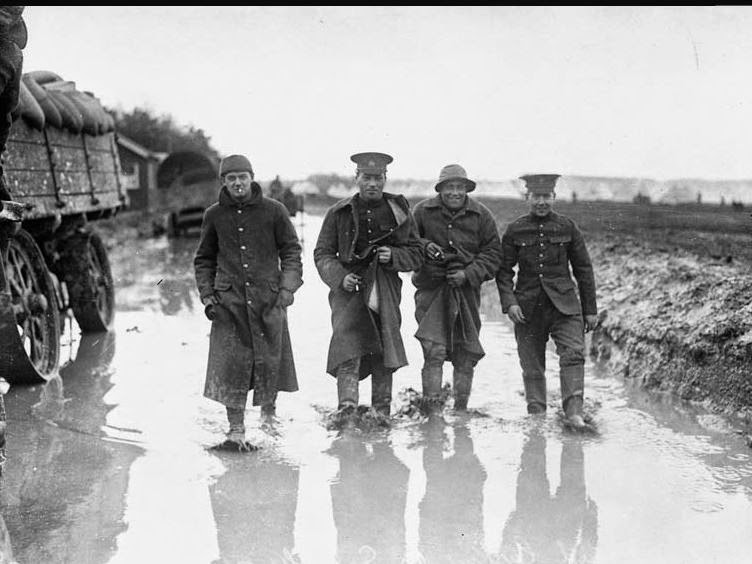Letter #4 of 88 From Charley Bailey at Salisbury Plain, October 23rd 1914
Written to his Mom in Viceroy, Saskatchewan. It won't be delivered to Viceroy till November 4th.
Salisbury Plain
England
Oct 23 / 14
Dear Mother
Arrived here after 21 days aboard ship. We had fine weather all the way over and a great voyage. The trip did not make me sick, funny it did not effect, as there was so many that were seasick. This place is sure pretty.
We landed in Devonport and marched to Plymouth, where we got the train to Salisbury. As you see by my address, I have transferred to a Hospital corps, from Hamilton Ontario. By the time you get this I will have seen London as we get a few days off.
Gee it is a funny country, hedges, roads and little villages. The Canadian soldiers are getting a great welcome here. When we were waiting for our trains at Plymouth, there were thousands there cheering us. One old lady came over and talked to me. When I left she threw her arms around me, kissed me and said “ God Bless you my little man.”
They were so glad to see us that they were giving us fruit, cigarettes and everything. The girls come up to you and beg for a button or a badge for a souvenir some of the boys landed in camp with all the buttons off their coat. But of course I am too bashful so naturally I had all my buttons on.
Was there anybody came out here from Viceroy. There is some talk of us going to [S-----] but I don’t know if it is true or not. On Sunday there is an inspection by Lord Roberts. So you see I am going to see some of the Lords and Dukes as well as the country. So far it has been just like a pleasure trip.
How does VV like Brandon College. I am going to write to her tonight. She will like it there I know as she will be acquainted by this time. Do you like Viceroy very much? If I can I will send you a keepsake from London. I am going to go threw Westminster Abbey and a few more of those places during my stay in London.
I saw the Winnipeg Red Cross Boys and they are a field ambulance; have to take care of horses and Red Cross wagons when I am in a Hospital you see things turned out pretty good for me. I am writing this laying on my stomach and it is no fun. So I will write often. Remember me to Dad with love from Chas.
P.S. My Address
No 2 Stationary Hospital
Salisbury Plain
Eng






October 15th, 1914
Here is an excerpt from another report in the Times of October 19, 1914
describing the scene on Salisbury Plain. The Canadians At
Salisbury.
"Nothing
like the Canadian Contingent has been landed in this country since the time of
William the Conqueror. Friendly forces and hostile forces have reached our
shores from time to time; the hostile ones always so badly found that they were
quickly extinguished, the friendly ones coming unequipped by reason of their
friendliness. But the Canadians come armed cap-a-pie,
horse, foot, and artillery. The force has its own engineers, signalers,
transport corps, ammunition parks, and field hospitals, and there are 34
chaplains and 105 nursing sisters. It would be a military offense to state the
number of million rounds of ammunition brought by the Contingent, so great is
it.
The
Contingent has come through without any trouble worth mentioning. The weather
was perfect throughout; the feeding and accommodation were first class, and the
health of the men excellent. It is believed that only 11 horses were lost
altogether, five of them in a ship that was loaded up for three weeks.
Disembarkation has been spread over three days, troops and material as
disembarked being entrained for Salisbury Plain, where camps at West Down
South, West Down North, Bustard, and Pond Farm have been prepared for them.
A
visit to Salisbury Plain on Saturday morning, therefore, was premature so far
as seeing the Canadians as a whole was concerned, for only the few who had
straggled in the night before were to be seen. But the roads in the
neighbourhood were full of them, just off the railway and marching to their
destinations. One saw men and horses in the rough, before they had polished
their boots or brushed their hair, or the horses had been groomed. Neither
looked the worse for being a trifle unkempt. Physically, of course, the men are
a fine lot, and in intelligence they are up to colonial form, which is usually
a trifle ahead of that of the old country.
Half
of them come from the West of Canada, and are hard fellows used to a rough
life. Only about half are Canadian born, and one good Scot assured me half of
the lot were Scotch, the remainder being English, Irish, Welsh, and French.
French Canadians are sprinkled all over the eastern contingents. Two brigades
wear the kilt. A few Regular British officers and quite a number of Canadian
officers who served in
South
Africa
are a great source of strength, as
are a number of Regular non-commissioned instructors.
Where
the Canadians are strong is in the type of which they are composed. Most of
them, officers and men, have roughed it at one time or another. Many are
thoroughly accustomed to horses. Many have succeeded in life on their own
merits alone. They are practical as colonials must be practical. And they have
courage and character, or they would not be where they are. But the probability
is that they will be ready before many others who cherish the same ambition-to
strike a blow for their country.
The
Troops At
Plymouth.
The
disembarking and entraining of the Canadian troops goes on steadily at
Plymouth. The Canadians
have made themselves popular at
Plymouth,
and the departure of every train in the early part of the night attracts large
crowds, which distribute cigarettes, fruit, and newspapers among the men, and
in return receive badges, buttons, and other souvenirs. An extraordinary
assortment of mascots and pets accompanies the contingent; dogs and goats and
other animals are numerous. One regiment actually adopted a small boy, a
newspaper seller who was anxious to go with them. He seems to have been
smuggled on board one of the transports, and has since become a bugler.
Indeed,
the Canadians did have a good many unusual mascots, one of them becoming very
famous.
The
March Through
Plymouth
The
Canadians will never forget the reception they had at
Plymouth. Great as was the welcome accorded
to the troops the day the transports steamed into Plymouth Sound, it was as
nothing compared to the enthusiasm manifested by the good people of
Plymouth as the soldiers from
Canada
marched through the city to
the various railway stations, there to entrain for the camp at Salisbury Plain.
Disembarkation, of course, was carried out behind the high walls of the
dockyard, entrance to which was denied to the citizens. Consequently the
residents had to content themselves with a foothold of the street pavement and
the knowledge that, sooner or later, the Canadians must emerge through the
dockyard gates en route to the trains. Large crowds assembled in witness the
departure of the troops, who seemed to be in high spirits and glad to stretch
their legs after being confined to the transports for nearly twenty days. The
throng gave some ringing cheers as the soldiers swung along the streets singing
the latest choruses, the favorite, as usual being "It's a long, long way to
Tipperary." All the way
to the station the streets were lined with cheering seamen and civilians, and
Canada's soldiers will not soon forget the
splendid treatment accorded them by the warmhearted people of
Plymouth. The residents handed cigarettes,
matches and other timely gifts to the Canadian volunteers as they marched
through the streets, while the troops reciprocated by giving regimental buttons
and such as souvenirs. Thousands of citizens remained at the station until the
last troop-train departed in the early hours of the morning. The trains left at
regular intervals, and the ringing cheers given by the spectators were returned
with equal vigor by the troops as each train pulled out of the depot.
A
Gift From Mrs. Astor.
The
onlookers manifested especially keen interest in the Toronto Highlanders, whose
ranks extended from one end of the platform to the other, the regiment being
over a thousand strong. The men sang and whistled popular Scottish airs while
they waited for the train, "Annie Laurie" finding most favor, while "Just a wee
Deoch an' Doris" was very popular and went with a good swing. Every man was in
his place two minutes after the order to entrain was given, and as the train
steamed out thousands of handkerchiefs fluttered good-byes. Similar scenes were
witnessed in
Plymouth
day after day until the disembarkation and entraining of over thirty thousand
troops had been completed. The headquarters staff and the nursing sisters were
among those who left
Plymouth
on Friday afternoon, the nurses in their navy blue greatcoats and hats,
attracting as much interest as the Highlanders on the previous day. At the
station a pleasant surprise awaited them in the shape of several pans of
Devonshire cream, these being the gift of Mrs. Waldorf Astor, wife of the
member of Parliament for
Plymouth.
On the Union Jack covering the pans was the inscription, "To the Canadian
Nurses, From Plymouth." Transportation arrangements were made by major G.H.
Gason, while Major-General A.P. Penton, Commander of the fortress, and other
officers were present at the station to witness the departure of the troops for
the training camp...."
________________________________________
Sources:
- Vimy Ridge History ~ an excellent WW1 research site soon to migrate. http://vimyridgehistory.com
- Life on Salisbury Plain ~ Canadian Great War Project http://www.canadiangreatwarproject.com/writing/Salisbury.asp
- For genealogists and historians, newspapers.com is a tremendous resource.
 VV was in her first semester at Brandon College. The same college Charley had graduated from a few years earlier.
VV was in her first semester at Brandon College. The same college Charley had graduated from a few years earlier.  The photo of VV below I think would be from that era.
The photo of VV below I think would be from that era. 






























